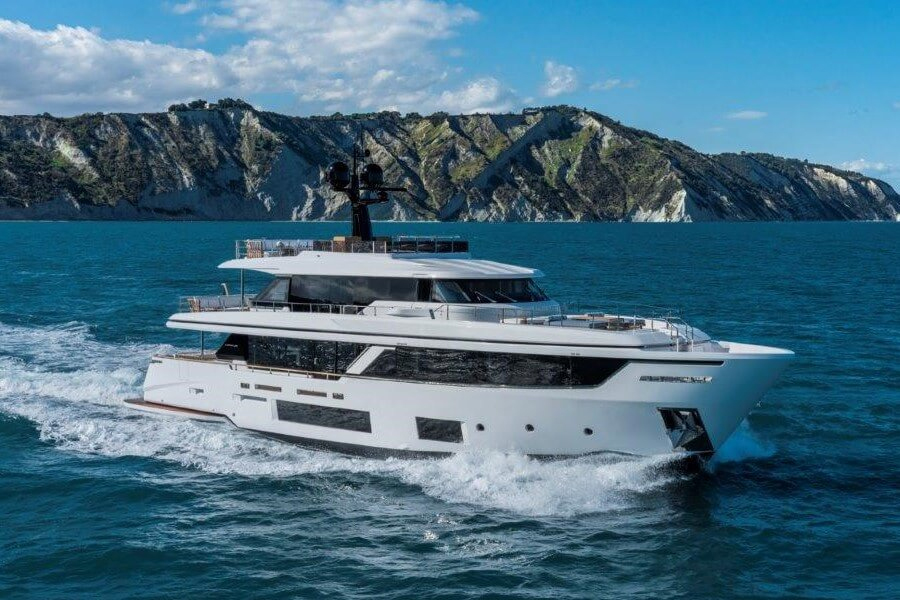 alt="Custom Line unveils Navetta 30"/>
alt="Custom Line unveils Navetta 30"/>
Custom Line has released details and images of its new Navetta 30, the superyacht brand’s first-ever collaboration with both exterior designer Filippo Salvetti and the Antonio Citterio Patricia Viel architectural studio that handled interiors. The yacht’s design team also includes the Ferretti Group Product Strategy Department led by Piero Ferrari and its Engineering Department.
With a length of 28.43m (93ft) and a beam of 7.3m (24ft), the wide-body yacht is 15ft shorter than the Navetta 33 yet just 8in narrower. Classified in CE category Class A, the brand’s new entry model has a volume close to 200GT, “offering volumes never achieved before in this market segment” according to Ferretti Group.

Antonio Citterio Patricia Viel designed the interiors and much of the furniture
The yacht features natural materials like leather, wood and rope, and emphasises curves and circular forms in a nod to seafaring traditions. The colour scheme on hull one is dominated by blue, brown leather and light wood, while the interior flooring features teak planks and longitudinal black Wenge inserts.
All the furniture and furnishings are custom made and highlights include the stern flag mast, teak ceilings and the curved, solid-wood window frames. Decorative wall-mounted lamps enrich the spaces with reflections and light effects.
The yacht offers over 320sqm (3,450sqm) of space on the lower deck, main deck, upper deck and the sundeck. Accommodation includes a master stateroom on the main deck and four guest cabins – some with tilted hull sides – on the lower deck, which has a captain’s cabin and two double crew cabins, all with ensuite bathrooms, in the bow.

Continuing the blue theme, the master suite is forward on the main deck
The main deck has a 34sqm cockpit that can be used as a both a dining and social area, and which connects to the living room. In the central lobby, an all-teak staircase links the lower, main and upper decks. To port is the galley by Ernestomeda, with access to the crew quarters on the lower deck.
On the starboard side, a day head precedes the 35sqm owner’s suite, which has an open study, large windows, central bed, roomy walk-in wardrobe and ensuite bathroom with twin basins, toilet and a big shower.

The upper-deck skylounge leads to an aft deck with dining for 10 and a full-beam beam sofa
The upper deck has an exterior lounge with a full-beam sofa and a dining table seating up to 10, leading to a 23sqm interior skylounge sofas, poufs, stools and chaises longues.
The helm station is fitted with the LOOP system by Naviop-Simrad, which integrates the management of propulsion, navigation and monitoring functions in the same naval-style interface, consisting of six 24-inch touch screen monitors or six 16-inch monitors. For maximum safety when manoeuvring, the unit has two side bridge wings.
The foredeck features a 32sqm ‘Sunset Lounge’ with custom-made freestanding furniture including a big forward-facing sofa and two chaise longues.

The forward part of the upper deck features a 32sqm ‘Sunset Lounge’
Aft, an sweeping exterior spiral stairway connects the upper deck with the 35sqm sundeck, which includes an aft lounge with a huge, full-beam sofa, as well as a forward bar with seats looking out to sea. The entire area can be sheltered by a bimini.
In the stern, aft of the engine room, the garage can accommodate a Williams Sportjet 435 tender and a jet ski. It’s fitted with an advanced version of Ferretti Group’s patented DMT (Dual Mode Transom), offering a double door movement and an additional feature that keeps the garage completely dry when closed and acts as ramp when open to make it easier to launch and recover the tender.

The sundeck, which can be covered by a bimini, has a full-beam sofa aft and a bar forward
The yacht is designed to use an optional plug-in hybrid propulsion system to reduce CO2 and NOX emissions. The standard propulsion is two MAN i-6 engines rated 800mhp each, although hull one has MAN V8 engines rated 1000mhp, which offer a transatlantic range of about 2,000nm at 10 knots (preliminary data).
The other engine options are two MAN V8 engines rated 1,200mhp and two 2 CAT C18 engines rated 1,150mhp, both versions offering a top speed of 15 knots (preliminary data). The Navetta 30 can be fitted with zero speed function stabiliser fins and a Seakeeper.

The beach area is generous for a 93ft motor yacht
Comfort at anchor and during navigation has been improved due to a new damping coupling on the propulsion line and to the evolution of the acoustic insulation.
The soundproofing treatments are the result of mathematical analysis targeted at each single source of noise and vibration, with soundproofed ceilings and the installation of a floating floor that reduces sound transmission from the engine room to the other areas.